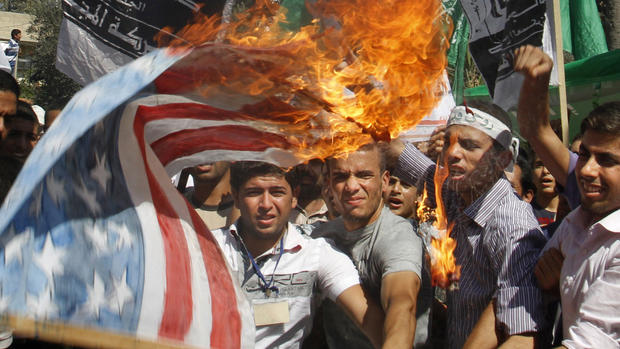Al Qaeda calls for more attacks on embassies
(AP) CAIRO - Al Qaeda's branch in Yemen praised the killing of the U.S. ambassador in Libya in a Web statement Saturday and called for more attacks to expel American embassies from Muslim nations.
The statement suggests al Qaeda was trying to co-opt the wave of angry protests in the Muslim world over a film produced in the United States denigrating the Prophet Muhammad.
In a move to try to end the unrest, the top religious authority in Saudi Arabia said Muslims should not be "dragged by anger" into violence, suggesting the film could not truly hurt Islam.
So far, there has been no evidence of a direct role by al Qaeda in the protests, which brought a flurry of attacks on American and other Western diplomatic missions this week. The protests have been fueled mainly by ultraconservative Islamists.
But U.S. and Libyan officials are investigating whether the protests were a cover for militants to target the U.S. Consulate in the Libyan city of Benghazi and kill Ambassador Chris Stevens and three other Americans on Tuesday.
Protesters, police clash outside U.S. Consulate in Sydney
Taliban claims Afghan attack, cites Prince Harry
Arab Winter? Unrest sparks debate on U.S. policy
Tunisian protesters pushed back after U.S. Embassy breach
Al Qaeda in the Arabian Peninsula, as the group in Yemen in known, said the killing of Stevens was "the best example" for those attacking embassies to follow.
"What has happened is a great event, and these efforts should come together in one goal, which is to expel the embassies of America from the lands of the Muslims," the group said. It called on protests to continue in Muslim nations "to set the fires blazing at these embassies."
In a separate statement, the group claimed that those who attacked the consulate in Libya were in part acting in anger over the killing in a U.S. drone strike earlier this year of Abu Yahya al-Libi, al Qaeda's then-number two.
"The killing of al-Libi only increased the enthusiasm and determination of the Libyan people to take revenge on those who belittled our religion and our messenger, so they stormed the American consulate and killed its ambassador, and they so, are rewarded by God, on behalf of Islam, the best reward," the group said in a eulogy to al-Libi, posted Friday.
In the Saturday statement, the group also reached out to "our Muslim brothers in Western nations," urging them "our Muslim brothers in the Western to fulfill their duties in supporting God's prophet ... because they are the most capable of reach them and vex them."
"If your freedom of speech is boundless, then let your chests bear the freedom of our actions."
Al Qaeda's No. 2 in Yemen killed in airstrike
Yemen: Al Qaeda land mines planted by fleeing militants kill 73 civilians
Terrorism roundup: Bad days for AQAP, but the threat remains
Al Qaeda in Yemen is considered by the U.S. the most dangerous and active of the terror network's affiliates after it plotted a series of attempted attacks on U.S. territory, including the Christmas 2009 failed bombing of a passenger jet. It has suffered a series of blows since, including the recent killing of its deputy leader in a drone strike. Yemen's government, backed by the U.S., has been waging an offensive against the group, taking back territory and cities I the south that the group's fighters seized last year.
On Friday, protests against the movie, titled "Innocence of Muslims," spread dramatically, breaking out in 20 nations in the Middle East and Southeast Asia. While peaceful in most places, the protests turned into assaults on U.S. and other Western embassies in Sudan and Tunis and violent clashes with police in several countries that left at least six dead.
Yemen saw protests Friday and the day before, when protesters stormed the U.S. Embassy and tore down the American flag.
Trying to contain the violence, the highest religious authority in Saudi Arabia said Saturday that "the film does not hurt the Prophet and Islam ... We have to denounce it without anger."
"Muslims should not be dragged by wrath and anger to shift from legitimate to forbidden action and by this, they will, unknowingly, fulfill some aims of the film," Saudi grand mufti Sheik Abdel-Aziz al-Sheik said.
